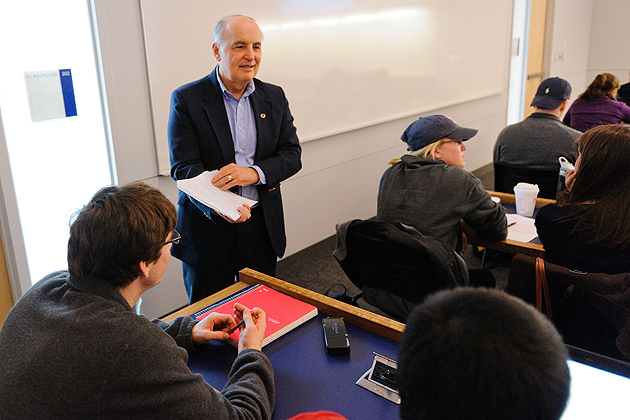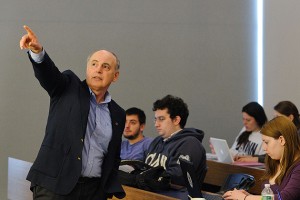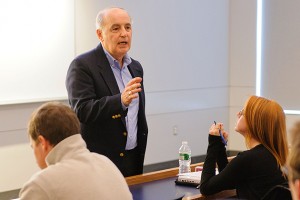
When Amy Holland ’12 (CLAS) signed up for a new course on the history of baseball, some family members were so suspicious that she had “senioritis” that she emailed the syllabus to them to prove its rigor.
In just its first few months, the three-credit class taught by family studies professor Steven Wisensale has drawn raves from students for its wide-ranging and challenging lessons on the sport’s history, cultural implications, and influence in areas ranging from race relations to public finance.
Wisensale’s class, “Baseball and Society: Politics, Economics, Race, and Gender,” is offered through the Department of Human Development and Family Studies in the College of Liberal Arts and Sciences, where he is a longtime professor, and also cross-listed with Women’s Studies and African-American Studies.
Holland and other students say Wisensale uses baseball as an avenue to explore many other facets of history: the business and labor aspects of sports; athletes’ roles in wartime; the experiences of female, gay, and minority ball players; its role as a pastime that binds generations of families and communities; and other topics.
“It’s a lot of work, but it’s ‘worth it’ work. It’s ‘I’m really learning a lot from this’ kind of work,” says Holland, of New Milford, who’s set to graduate in May with a bachelor’s degree in human development and family studies and psychology.
“Professor Wisensale’s enthusiasm for the course makes us really want to do the work,” says Holland, who isn’t much of a sports fan, but whose Yankees-loving family members were sufficiently impressed by Wisensale’s syllabus to dismiss their fears that Holland was in the throes of senioritis.

An “easy A” is the last thing that anyone who’s taken one of Wisensale’s courses would expect, though, and he made it clear from the start that anyone who expected to sit around and simply shoot the breeze about baseball would be in for a big surprise.
“The demands of this course are pretty severe. I didn’t want it to get a reputation as a magnet for anyone who just wanted to get three easy credits,” says Wisensale, a two-time Fulbright Fellowship winner whose specialties are family policy and gerontology, but who has had a lifelong passion for baseball.
Some other universities nationwide have offered courses in the history and literature of various sports or about specific aspects of baseball, including statistical analysis of players’ achievements. But Wisensale’s course is the first in recent years at UConn, and he hopes other departments might soon agree to cross-list it among offerings for their majors, too.
Wisensale fielded 180 applications and accepted 52 students, an almost even blend of males and females. Some were lifelong baseball fans who wanted to add to their knowledge, while others were students in Wisensale’s other classes and were drawn by their admiration of his teaching style.
“When students asked to sign up, I’d write back and say, ‘Are you ready to read five books, view probably 20 videos, take quizzes and exams, and complete a portfolio of some pretty challenging assignments?’ If they said, ‘Yes, that’s exactly what I want to do,’ I’d say to come to class – but I think even some of those students were shocked by how serious the workload is.”
Wisensale, who grew up in southeastern Pennsylvania, is a Baltimore Orioles fan – something that students say he slips into conversation, but without letting the academic tenor of the class slide into a lengthy gab fest about various teams. “He tells us, ‘I will not weigh in on the Yankees vs. the Red Sox because you’re all wrong,” Holland says.

None of his current students are members of UConn’s baseball team, whose practice schedule conflicts with the twice-weekly courses. A few are on UConn fall sports teams, while some are fans who wear their allegiance on their hats or shirts – or, like Holland, are interested but less knowledgeable.
Alex Bryce, a sophomore from Storrs majoring in kinesiology, signed up for the class with a better-than-average knowledge of baseball, having played it throughout his life. He’s currently on a UConn club baseball team and plays in the Greater Hartford Twilight Baseball League, all of which he was able to share in the personalized “baseball cards” that students created for themselves as one of Wisensale’s first assignments to help them get to know each other.
“He made it very clear from the beginning that there was going to be a lot of information and it wasn’t going to be a throwaway class, and he was right,” Bryce says. “He’s also done a good job ensuring you could come into the class without a significant background in baseball and he’d still provide the tools to succeed.”
Wisensale will be on sabbatical next fall, but expects to offer the baseball course again next spring.
“To start a new course is a lot of hard work,” he says, “but it’s a labor of love.”



